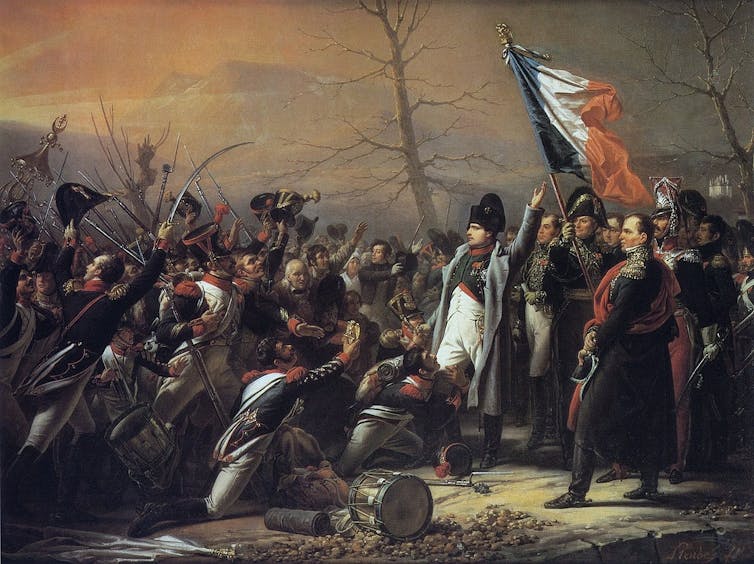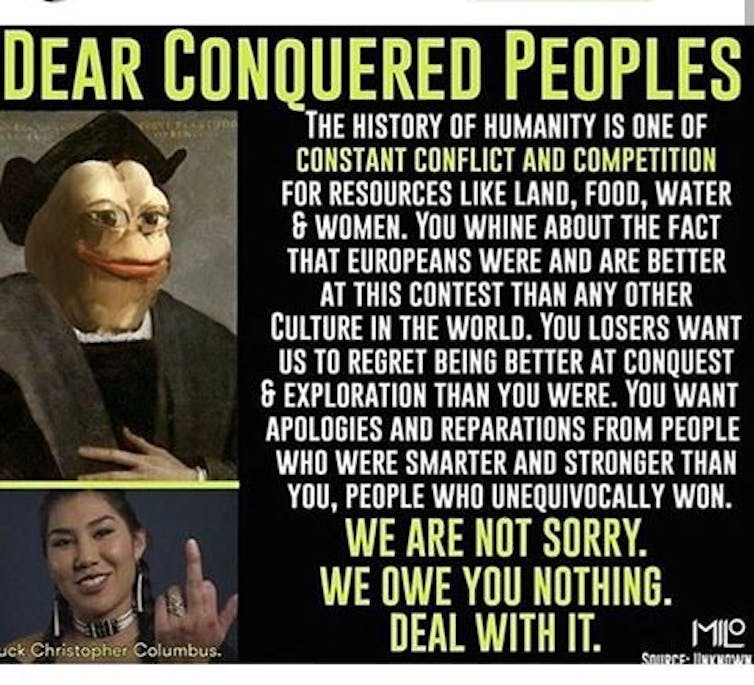The New Right: the extreme nationalism behind Brexit and Donald Trump
The New Right: how a Frenchman born 150 years ago inspired the extreme nationalism behind Brexit and Donald Trump
Dressed in pastel-coloured Sunday best, Charles does not look like your typical far-right extremist. Yet he is a member of Génération Identitaire, a militant French youth group keen to overcome the thuggish reputation of the far right. Génération Identitaire is a key example of contemporary nationalist movements and has become particularly notorious after the attack perpetrated by one of its members in Christchurch, New Zealand.
Génération Identitaire’s rallies in the suburbs of French cities feature speeches lamenting the replacement of Europeans by Muslims, “métissage imposé” (forced inter-breeding), chanting “La France est à nous” (“France is ours”), and provocative marches through areas inhabited by minorities, that often descend into beatings. These young nationalists told us that they march to reclaim Europe from foreign invasion by migrants that destroy French culture, stifle their aspirations, steal their jobs, their cities, and even their women.
They also seek to demonstrate the kindness of their ideas by assisting homeless people with food, clothes and hot drinks – but only if the people they help are French and, more specifically, “français de souche”, which usually refers to having white French ancestors.
As we march through the Parisian streets, Charles explains that Génération Identitaire is fuelled by love for the “real” French. For him, it is natural that patriotism should produce love for “his” people, as we saw with the beggars, as well as hatred and violence towards foreigners and feminists. Charles, following the example of Identitarian leaders, believes that nature has already produced a perfectly functional Western culture based around white race, Christianity and a “proper” social order.

They argue that any change in that “nature”, such as inclusion of foreigners or changes to the social role of women, is bound to destroy Western cultures. This is not racist, xenophobic or even harassment, Charles reassures as the march pauses to scream at a dark-skinned young woman to “go home”.
In common with the American alt-right and many anti-migration nationalists throughout the West, Charles believes that it is only natural that an identity looks after its own kin at the expense of others. It is not hatred, Charles insists, just self-preservation.
This article is part of Conversation Insights
The Conversation’s Insights team generates long-form journalism derived from interdisciplinary research. The team is working with academics from different backgrounds who have been engaged in projects aimed at tackling societal and scientific challenges. In generating these narratives we hope to bring areas of interdisciplinary research to a wider audience.
You can read more Insights stories here.
The New Right
Nationalists such as Charles often refer to themselves as the New Right, or read thinkers who do. They are not all as radical as he is, but a diverse grouping of politicians share the stream of New Right ideas. These include Donald Trump, Brexiteers like Jacob Rees-Mogg, European nationalists like Marine Le Pen, Matteo Salvini and Viktor Orbán, and newcomers such as Santiago Abascal and his Vox party in Spain.
All of these politicians maintain informal yet relatively loyal alliances with more extreme groups like Génération Identitaire, the US alt-right, or Fratelli d’Italia. Such groups bring together young activists and champion extreme nationalist causes and campaigning. Not content with democratic engagement, they act vigorously online and in the street against those they consider as threats to their very survival: immigrants, feminists and liberals.
It is very common for liberals and leftists to accuse new nationalists like Trump or Le Pen of returning to 1930s Nazism. Such accusations of fascism are mostly aesthetic: insults hurled at nationalists by ever more outraged liberal echo chambers. To nationalists, all opponents have become communist feminists; to liberals, nationalists are all wannabe Hitlers.
We spent the last two years analysing hundreds of documents written by New Right thinkers and their forebears to explain how and why these ideas take root. This ideological history is important if today’s nationalists are to be understood, and if there is to be any hope of overcoming the racism and sexism inherent to their ideas.
What our research shows is that we are living through the latest battle in a 300-year long ideological war over the meaning of humanity itself. On one side is the belief in a universal idea of humanity, which produced notions of equal rights, humanism and liberalism. Opposing it is the belief that marks all forms of nationalism: that humanity is not a single entity but rather, one divided by nature into national identities.
Beginnings
Nationalism is the dark cousin of liberalism. Both seek to establish freedoms and rights. If the French Revolution gave rise to the “rights of man”, Napoleon’s subsequent coup and his idea of the “nation” argued that only the French, not all men, should enjoy those rights. Half a century later, nationalism was being regularly used by politicians like Otto von Bismarck to confront expanding claims to political rights with the argument that the national necessity of a vaguely defined identity trumped granting certain rights to citizens.

These ideas drew heavily on ethno-nationalist geopolitics, which treated each nation as a distinct species struggling for survival. International relations was viewed as a zero-sum game where the survival of a nation sometimes necessitates the destruction of others.
Then Maurice Barrès came along 1897. He was the thinker behind a very specific set of nationalist ideas that developed more restrictive definitions of national identity than those of the previous nationalist pioneers. His idea of nationalism was focused on birth and culture, rather than civil belonging (as for Napoleon) or loyalty (as for Bismarck). Our research has found that key ideas in today’s New Right find their roots in Barrès and especially retain his ideas about culture and racial birth.

Barrès theorised that the culture and integrity of a nation was “eternal”, and that any change to it, whether brought about by foreign influence or progressive politics, would bring about its demise. Any cultural change, be it to the arts, to the role of women, or to racial assumptions, was seen to erode the spirit of the nation and its way of life. Ideas about the state, belonging and politics, which emerged from Barrès and like-minded thinkers like Charles Maurras tended to advocate racial and cultural exclusion as necessary to national survival.
The key idea introduced by Barrès was the link between race and culture. It meant that culture needed to remain unchanged if it was to survive, as did the race that produced it. Even more importantly, it introduced the notion that any progressive, modern or culture-changing idea endangered the nation’s survival. This idea has found its way to the heart of New Right nationalism today, which is why they attack liberals, socialists, feminists, progressives, and their institutions as much as foreigners.
Today’s New Right share much more with these 19th-century nationalists than the fascists of the 1920s and 1930s, like Benito Mussolini, Adolf Hitler, Francisco Franco and Turkey’s Mustafa Kemal. Yet it is important to understand why.
Fascists also believed that geopolitics was characterised by competition between states struggling for survival. But, rather than professing faith in the status quo, they pursued a revolution in all aspects of society to prepare for this existential struggle. They advocated radical social and even biological change. Cultural change was not avoided – as it is by nationalists today and was in the 19th century – but designed for.

Mussolini, for example, sought to dismantle Italian family values and relations, so as to foster new relations between individuals and the state. Working Italians were organised to eat, exercise and even socialise together, rather than with their families. This proposed a huge change to everyday life, reforming the structure of society to instil loyalty to the state and its leader.
Likewise, fascists sought racial purification and expansion through modern science. In anticipation of populating huge empires after the destruction of their original populations, Nazi scientific ambitions sought to double the German population by intervening in women’s bodies to ensure each pregnancy yielded twins.
Fascist nationalism gave total control to a saviour-leader. It demanded total discipline over the entire country and all of its social, cultural, biological, economic and even artistic functions.
Nostalgia and purification
Fascist revolution is clearly not the intellectual precedent of the nationalisms of today. The fascist generation of nationalists hoped to radically change their societies. Today’s nationalists want only to stop and reverse social change.
If we explore the New Right’s reasons for wishing to do so, we find the idea, pioneered by Barrès, that cultural change signifies decadence and corruption. This is why nationalists in our time have no plans to supercharge and empower their nation. They don’t need one. They believe in the perfection of national culture, and want to set it free from any presumption of equality with other identities. Once freed in this way, they argue, culture will thrive and fulfil its innate potential.
This is why today’s nationalists are so nostalgic. It is also why they consistently speak of culture, not race. Indeed, they are often vocal in claiming that race is not their concern. They can do this because the idea of birth-culture inherited from Barrès is already based on race. As their intellectual pioneer, French philosopher Alain de Benoist, argued in 1999:
Mankind as such does not exist, because their membership within humanity is always mediated by a particular cultural belonging … Biological differences are significant only in reference to social and cultural givens.
Here, race is relevant only insofar as it determines which culture an individual may belong to. Cultural belonging is underpinned by birth, which is why speaking and defending culture, as the New Right does, has powerful racial implications. But conveniently, the emphasis on culture circumvents restrictions on – and public revulsion for – overt racism.
The assumption that cultures are caught in a permanent struggle for survival is liable to tend toward extremes. Many on the alt-right in America and in movements like Génération Identitaire in Europe have already taken these beliefs to their inevitable conclusion: that a global race war needs to be fought to ensure the survival of the white race.
The gunman who attacked a mosque in Christchurch, New Zealand, like Anders Breivik in Norway in 2011 and the Charlottesville protesters in 2017 in the US, was not only a member of Génération Identitaire, but certain that his actions were the first shots in a struggle over the survival of “Europeans”.
Birth-culture
The New Right, like Barrès before them, purport that culture is biologically mediated rather than socially determined. If one is of the wrong biology then participating in another culture is difficult, if not impossible. The restoration of the nation logically requires the purification of culture and – by implication – race.
By the same token, any assumption of equality among identities is a kind of betrayal of the nation, which undermines its chances of survival. This explains all sorts of very real grievances to voters, from poverty to social frustrations. All of these are attributed to an upending of the natural order that gives equal rights to those who have no “natural” stake in a culture.
The same intellectual mechanism is responsible for the New Right’s fixation with gender. Just as biology determines which culture one may or may not belong and thrive in, biological differences between sexes are seen to determine women’s social and political role.
The liberation of women is viewed as a prime example of how liberal humanist assumptions about equality are unnatural and destroy culture. Women’s control of their reproductive functions is viewed as undermining the nation’s survival in yielding to the selfish caprice of women that refuse to play their nature-given, distinctive, part.
The Brexit referendum campaign and Salvini’s 2017 electoral campaign in Italy are excellent examples of how these ideas can unfold in practice. Leavers like Farage, for example, never argued that migration was to be limited due to racial difference, but demanded the right to “retake control of our borders” in the name of the preservation and prosperity of the nation and its culture. Salvini likewise avoids race and focuses on the right of Italians to prevent migration and ensure Italy’s survival. And, like Vox in Spain, he advocates a rollback of Italian women’s rights, beginning with contraception, to restore “the natural order”.
New Right ideas centre around the claim that nature should determine the structure of society and politics, and so their advocates seek to restore what they see as the natural state – one determined by inequality among identities. This is contrasted against liberal ideas that subvert the natural order of different genders, identities and the struggle among nations.

Truth, red pills and conspiracies
The war against the rights of foreigners and of women takes us to the heart of contemporary nationalist ideas. To betray the “natural order” is a betrayal of one’s own identity and its survival. Their war is against the liberal understanding of equality.
This has implications for how the New Right think about truth. They have determined that mainstream news cannot be believed using an idea sometimes referred to as “the cathedral”. This posits that modern universities, media and cultural institutions function to establish and enforce faith in liberalism, viewed as a kind of new religion. The New Right argue that any rational questioning of liberal beliefs around gender, race or culture becomes heresy. This suggests that the New Right see themselves as the true heirs to the Enlightenment project to free humanity from ignorance and superstition.
New Right politicians prove their credibility through willingness to publicly depart from irrational faith in liberal ideas, so as to represent the legitimate interests of the identity that is “left behind”. This is why Michael Gove, the UK’s Secretary of State for Environment, was able to casually throw scientific expertise out the window in the Brexit referendum and why Trump survives the spectacle of issuing “alternative facts” from the White House.
For this reason, the New Right’s characteristic loathing for political correctness is not just a matter of humour and off colour jokes. It signals to supporters that their leaders are willing to transgress liberal power. Trump’s “grab them by the pussy” as well as regular chauvinistic comments from New Right politicians like Nigel Farage and Salvini play so well with supporters because they are read as a promise to return public discourse to a natural state of freedom.
New Right ideas about survival and identity coalesce in the belief that they have seen through an “unnatural” story woven by liberals. Consider the concept of the “red pill”, common in New Right online discussion threads, which refers to a scene from the Matrix in which Neo is asked whether he wishes to see harsh reality or a pleasant illusion. To be red-pilled is to see “the truth”: a world destroyed by liberal assumptions of equality, between genders and national identities, but also between weak and strong, rich and poor, masking the natural condition that rewards strength and punishes weakness.
Going mainstream
Conspiracy theories flourish today. In fact, they are now mainstream. Hitherto the fare of online cranks, frustrated teenagers and professional conspiracy theorists like Alex Jones, in the early 2010s New Right ideas began to take off thanks to specific grievances that they claimed to explain.
The online incubation of New Right ideas in the run up to Trump’s election was underwritten by the argument that gains from a millennia of white male leadership are being undermined by “libtards” (“liberal retards”) and “SJWs” (“social justice warriors”) informed by “fake news” and wracked by “white guilt” who give away the achievements of Europeans to others, and even undermine their own survival by losing control of their women.
This way of thinking is used to explain all manner of grievances ranging from shifts in the world of work, loss of control over one’s destiny, hopelessness, and community decay. If one buys into their assumptions, their ideas make sense on their own terms and seem to offer immediate solutions to these problems.
Disparate movements have united around these grievances. So New Right politicians often form strange but powerful electoral alliances. The basic template usually seeks to secure a broader vote by mainstreaming or taking over a party (as with Trump’s takeover of the Republican Party) while retaining the extremist vote through proxies that are neither overtly recognised as allies nor disavowed (the alt-right and even the KKK in Trump’s case).
This system of New Right electoral alliances clearly emerged in the Brexit referendum: despite superficial disagreements, Vote Leave, Leave.EU and UKIP never fully contradicted one another. The same is true of Trump’s Republicans and alt-right “very fine people”; Le Pen’s Front (now Rassemblement) National and Génération Identitaire; and Salvini’s Lega and Fratelli d’Italia, Forza Nuova and Casa Pound. These alliances are mostly leaderless, unstable and scarily undisciplined.
Shapeshifters
This is what makes this new generation of nationalism truly viral. Without a permanent structure, these shapeshifting alliances can dodge attacks by reinventing new coalitions of similar members, as occurred with Farage’s Brexit Party.
These coalitions depend on the continued presence of grievances that directly affect people’s lives, particularly growing poverty even when working, the collapse of stable and safe social identities linked to work, the increasing instability of employment security, and the rapid change of local communities due to emigration, migration, collapsing housing affordability, and redevelopment initiatives that displace communities. These provide precise and urgent electoral rallying points.
They are particularly effective given that so many mainstream politicians ignore these basic grievances. In recent years, the lineup of politicians opposing the New Right – Hillary Clinton, the Remain campaign, Emmanuel Macron and Matteo Renzi – have been unwilling to even recognise these structural problems. This provided the New Right the opportunity to appear credible, simply by acknowledging them. They also appear to offer elegant solutions to these societal issues – all of which are based on a return to the “natural” order.
The New Right stems from 19th-century ideas, updated for our times. It ultimately promotes a rather sad view of humanity, where everything is determined by nature, not by individual choice. A world where culture is biologically mediated, immobile and restricted, not the fruit of learning and creativity.
If their success is to be confronted, the basic grievances they claim to resolve will need to be addressed and solutions offered. But if the contradictory informal, yet powerful alliances among nationalists today are to be challenged, the working mechanics of New Right ideas must be understood.
Authors:
